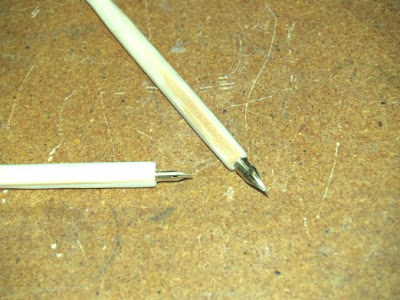 Today in the wood shop at Clear Spring, the 1st and 2nd grade students made vehicles based on ones they see in use in Eureka Springs. The 3rd and 4th grade students made their own ink pens based on early Sloyd models, but also related to their study of westward migration and the Pony Express. If we're very lucky the pens may help them to take an interest in the potential beauty that can be expressed as hand writing... an area of craftsmanship that is suffering severely now that people think computers should do everything for them.
Today in the wood shop at Clear Spring, the 1st and 2nd grade students made vehicles based on ones they see in use in Eureka Springs. The 3rd and 4th grade students made their own ink pens based on early Sloyd models, but also related to their study of westward migration and the Pony Express. If we're very lucky the pens may help them to take an interest in the potential beauty that can be expressed as hand writing... an area of craftsmanship that is suffering severely now that people think computers should do everything for them.Here is a bit more from Charles H. Hamm's Mind and Hand:
A purely mental acquirement is a theorem--something to be proved. As to whether the theorem is susceptible of proof is always a question until the doubt is solved by the act of doing. Hence Comenius's definition of education--"Let those things that have to be done be learned by doing them."--is profoundly philosophical, since nothing can be fully learned without the final act of doing, owing to the fact of the incompleteness of all theoretical knowledge.The photos below are of sample pens(not student work), and the first and 2nd grade students with their vehicles.
The mind and hand are natural allies. The mind speculates; the hand test the speculations of the mind by the law of practical application. The hand explodes the errors of the mind, for it inquires, so to speak, by the act of doing, whether or not a given theorem is demonstratable in the form of a problem. The hand is, therefore, not only constantly searching after the truth, but is constantly finding it. It is possible for the mind to indulge in false logic, to make the worse appear the better reason without instant exposure. But for the hand to work falsely is to produce a misshapen thing--tool or machine--which in its construction gives the lie to its maker. Thus the hand that is false to truth, in the very act publishes the verdict of its own guilt, exposes itself to contempt and derision, convicts itself of unskilfulness or of dishonesty.
There is no escaping the logical conclusion of an investigation into the relations existing between the mind and the hand. The hand is scarcely less the guide than the agent of the mind. It steadies the mind. It is the mind's moral rudder, its balance-wheel. It is the mind's monitor. It is constantly appealing to the mind, by its acts, to "hew to the line, let the chips fly where they may"


No comments:
Post a Comment